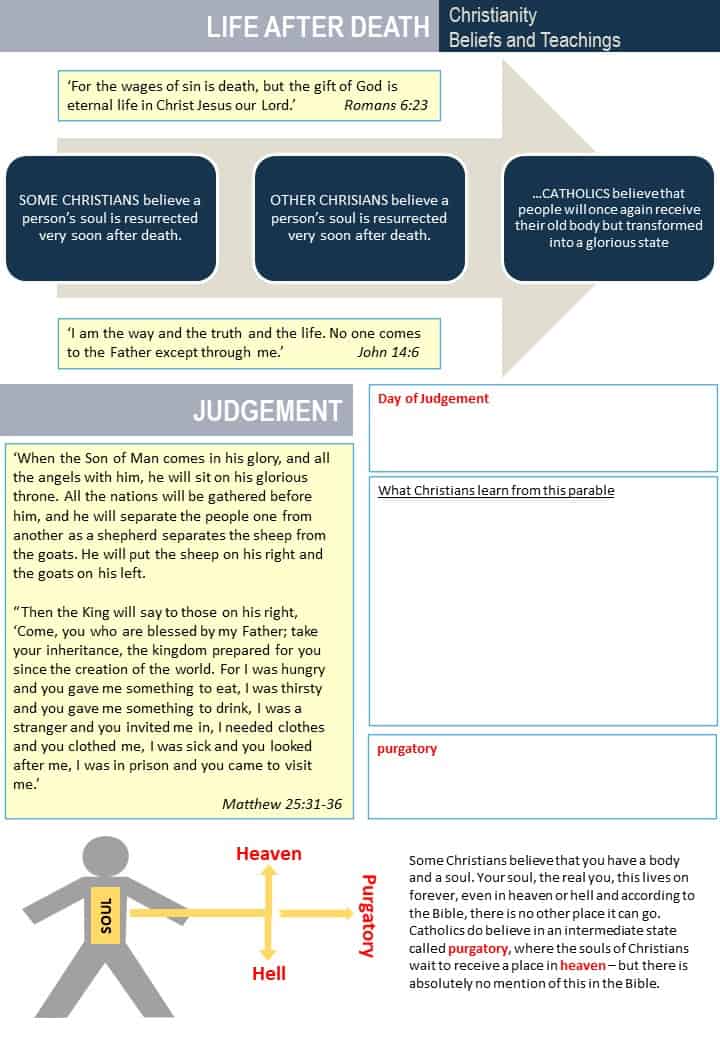Christian beliefs & teachings
Jesus Christ & salvation
- sin, including original sin
- the means of salvation, including law, grace and Spirit
- the role of Christ in salvation including the idea of atonement.
Sin & judgement
Give two Christian teachings about original sin. (2)
2018
- Original sin means the first sin of Adam and Eve.
- They disobeyed God by eating fruit from the forbidden tree.
- That knowledge concerns sexual awareness / the sexual act.
- Eating the fruit made them aware of their own sinful act.
- The result is separation from God.
- Another result is death.
- Humans are now born with a built-in tendency to sin.
- Jesus’ death atoned for original sin, etc.
Explain two Christian teachings about sin. (5)
2021
- Christians generally understand sin as any action or thought that goes against God / eg murder sins against God’s commandment not to murder (Exodus 20:13) / murder is wrong not because it is against the law but because God forbids it as being a sin.
- Some Christians teach that humans are born with a tendency to commit sin / they derive this idea from the story of Adam and Eve in Genesis 3 / who sinned by breaking God’s instruction not to eat from the fruit of the tree of the knowledge of good and evil.
- The sin of Adam and Eve is seen by some as the ‘original sin’ / a doctrine from St Augustine / and some Christians believe that original sin is present in every human / until it is removed by baptism.
- Some teach that sin was brought about by Satan, who (in the form of the serpent) tempted Eve to eat the fruit (Genesis 3:1-7) / others see sin as the result of God’s gift to humans of free will. Having free will makes people responsible for their actions / so some Christians think that humans are judged by God when they die.
- Christians believe that they are saved from sin by God’s grace / so long as they repent.
- Christians believe that they can be saved from sin because Jesus died in order to bring that about / Christians have different beliefs about how salvation from sin works / eg by obeying God’s laws / by having one’s sins forgiven through God’s grace, etc.
Sources of authority might include:
‘But the serpent said to the woman, “You will not die. For God knows that when you eat of it your
eyes will be opened, and you will be like God, knowing good and evil.”‘ (Genesis 3:4-5).
‘… she will bear a son, and you shall call his name Jesus, for he will save his people from their sins.’ (Matthew 1:21).
‘… that you may know that the Son of man has authority on earth to forgive sins – he said to the paralytic – “I say to you, rise, take up your pallet and go home.”’ (Mark 2:10-11).
Explain two Christian beliefs about the causes of sin. (5)
2019
- Sin can be caused by many things, particularly the mind, eg: lust (Matthew 5:28 – ‘Everyone who looks at a woman lustfully has already committed adultery in his heart’) / greed/love of money (Luke 16, the unjust steward) / love of material things (Luke 16:13 – ‘You cannot serve both God and worldly things’) / violence (Matthew 5:39 – ‘Do not resist one who is evil – if any one strikes you on the right cheek, turn the other cheek to him also’ / repeated sin (Jesus in John 8:34:
‘Whoever commits sin is a slave to sin’), etc. - Some believe that Satan / the Devil causes people to sin / tempts people to sin, eg the temptations of Jesus (Luke 4:1–13), where Jesus is tempted by such things as bodily hunger and promises of worldly power.
- Also, some understand ‘lead us not into temptation’ in the Lord’s Prayer (Matthew 6:13) to mean, ‘Do not let us be tempted to sin by others, by ourselves, or by Satan’.
- Some Christians believe the story in the Book of Genesis, where sin originated in the Garden of Eden / when humans disobeyed God / ate the forbidden fruit / thought they could be like God.
- Some think that all humans inherit the ‘original’ sin of Adam & Eve / some understand Jesus’ forgiveness of the sins of the paralysed man (Mark 2:1–12) in this light.
- Some believe that God causes sin / because as the Creator God is responsible for everything that exists / God made humans imperfect / God gave us free will / so for these reasons humans sin.
- Sin can be caused by separation from God / eg Adam and Eve were punished by being thrown out of the Garden.
- Credit wider social causes of sin, such as poverty, upbringing, addiction, etc.
Explain two ways in which belief in hell influences Christians today. (4)
2020
- Many Christians are influenced by the belief that they will be judged when they die (eg as in the Parable of the Sheep and the Goats, Matthew 25:31-46) / and that being sent to hell/eternal torment is a real possibility, so they may decide to follow Jesus’ teachings.
- In both Christian literature and artwork, hell has been pictured as a place of punishment / a place of unquenchable fire and torment / so a big influence on Christians here is to make them scared of going there.
- Belief in hell as a place of suffering influences Christians to follow Christian beliefs and teachings so that they will not be sent there.
- Some Christians understand hell as a metaphor for separation from God / which again influences them to follow Jesus’ teachings.
- Some see hell as a free choice to deliberately turn away from God / so most do not reject God.
- Some see the idea of hell as so horrible that they reject the idea of it / they are influenced to believe in universalism / that everybody will be saved / because God is a God of love, etc.
Explain two ways in which belief in judgement by God influences Christians today. (4)
2022
- Jesus died on the cross / for forgiveness of sins
- Christians believe that at some point they will die, or the world will end, and they will be judged by God / and will be rewarded or punished / this influences some to follow Christian rules to be rewarded.
- Christians believe that the reward is heaven, to be in God’s presence / so they will aim not to sin, to lead a good life so that they are judged fit for heaven.
• Some believe in judgement to a literal hell / so they are influenced by fear to avoid breaking Christian rules. - The Apostles’ Creed teaches that God is the judge of both the living and the dead / so they may be influenced to hope that their friends and family who have already died will be sent to heaven.
- Some will be influenced to study the Bible to find out how to avoid judgement to hell / so they might look (for example) at Jesus’ Parable of the Sheep and the Goats (Matthew 25:31-46) to find out what kind of behaviour leads to heaven or to hell.
- God judges peoples’ actions during their lives / so they would try to please him / lead a moral life / worship God.
- Jesus is the Way / so they will evangelise (spread his teachings), etc
Explain two Christian teachings about judgement. (5)
Spec 1
- judgement will happen after death: everyone will be raised from the
dead and will face God/Jesus for judgement; this may happen at
the end of time or Second Coming. Apostles’ Creed - they will be judged on the basis of what they have said and done:
how they have used their ‘talents’, how they have helped others;
Matthew 25 parables of the Talents and the Sheep and the Goats - after judgement they will be sent to heaven, hell or purgatory;
explanation of concepts of heaven/hell/purgatory. Matthew 25:46,
John 5:29
Role of Christ in salvation
Explain two Christian beliefs about the role of Jesus Christ in salvation. (5)
2020
- Salvation means to be saved from sin and the consequences of sin.
- Some Christians believe that sin entered the world through the ‘original sin’ of Adam and Eve / when they ignored God’s command not to eat from the tree of knowledge of good and evil / the result of disobedience was separation from God, and death (Genesis 2 & 3).
- Christians believe that salvation from sin comes from the life and teachings of Jesus / St Paul explains this in Romans 6:23: ‘The wages of sin is death, but God’s free gift is eternal life through Christ Jesus our Lord’.
- Jesus was aware that his death was necessary in order to restore the right relationship between humans and God / to make forgiveness and eternal life possible for all people.
- Jesus allowed himself to be crucified by the Romans / even though he was innocent of the charges brought against him by the Romans and the Jews / so his crucifixion was the execution of an innocent man / Jesus was the Son of God, so he had miraculous powers / and could have escaped crucifixion / and some of those near him at the crucifixion urged him to do that (Matthew
27:42 – ‘He saved others, but he cannot save himself! Let him come down from the cross, and we will believe in him.’). - After his death in this way, the Gospels record that Jesus rose from the dead / and that God accepted Jesus’s sacrifice as an ‘atonement’ for human sin / the idea of the Atonement therefore means that salvation became available for all humans / because Jesus’ suffering and death restored the right relationship between humans and God / so the author of 1 John says: ‘If anybody does sin, we have an advocate with the Father – Jesus Christ. He is the atoning sacrifice
for sins’ / humans can return to paradise/live for ever in paradise / by believing in Jesus and following his teachings. - Peter says (Acts 4:12) that salvation exists through Jesus and no one else: ‘there is no other name under heaven by which we must be saved.’
- St Paul summarises Jesus’ role in salvation by saying: ‘If you say with your mouth, “Jesus is Lord”, and believe in your heart that God raised him from the dead, you will be saved.’ (Romans 10:9-10), etc.
Resources
Videos











